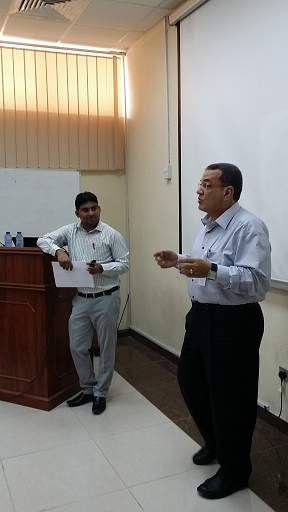
In the framework of enlightening the teaching staff about the efforts being made by the UQU College of Public Health and Health Informatics as part of its journey towards maintaining the National Commission for Academic Accreditation and Assessment's (NCAAA) quality project, the college held a scientific lecture entitled "Journey Towards NCAAA Quality Project at FPH&HI". The lecture, held on Monday, Safar 2, 1439H, corresponding to October 30, 2017, was given by Dr. Mohamed Kamal Hussain, a specialist in the Department of Health and Hospitals Administration and an associate professor in the Department of Health Information Management and Technology. The lecture was attended by the college's Dean, Dr. Waheeb bin Dakheel-Allah al-Harbi, Supervisor of Quality and Academic Accreditation, Dr. Hamed Ghanem, vice-deanships and departments supervisors and a number of the teaching staff from the college's departments.
At the beginning of the lecture, Dr. Kamal showcased the presentation topics, which were: defining quality, understanding academic quality, NCAAA standards, the college's accomplishments in 2016-2017, departments' main roles and responsibilities, the action plan set to fulfill the NCAAA standards, and finally an open discussion around these topics.
Kamel explained that quality is an ongoing process of gradual enhancement. As a client-centered process, he added, quality is driven by clients, and is aimed to maintain their satisfaction. Quality depends on abundant data to ensure effective and efficient decision-making. It is a continuous and dynamic process that is applied all over the organization. It is not the responsibility of the Quality and Academic Accreditation Department only, he stressed, but a collective responsibility shared by all departments.
As for the academic quality, it is a means to describe the availability of learning opportunities for students. It is also related to providing students with learning opportunities, support and appreciation, as well as creating a suitable and effective learning atmosphere, all of which can be guaranteed, measured and promoted.
Regarding the NCAAA's project, Kamel noted that it includes all four programs of the College of Public Health and Health Informatics, which are: Health Information Management and Technology (HIMT), Epidemiology, Health Education and Promotion, and Environmental Health. The accreditation program includes 11 criteria, with 440 measurable elements and 57 sub-elements; each has a percentage relative weight.
To implement this project, the college has formed a steering committee, and a quality unit, which has prepared an action plan for the quality accreditation, with the assistance of all the quality coordinators in different departments, as well as all employees and heads of departments. The committee submits a regular progress report to the college's Vice Dean for Development and Community Service.
Moreover, Kamal listed a number of the college's NCAAA-project-related accomplishments during the period between 2016 and 2017. Among those accomplishments are: updating the program specifications; updating course outlines; preparing reports on the previous semester courses; preparing course files of all semesters; developing key performance indicators (KPIs); in addition to surveying evaluations of curricula and programs; developing the strategic plan; developing the academic programs guide; creating the self-study template in two forms; preparing the programs' annual reports; measuring targeted learning outputs; updating users' CVs; developing the vision, mission and objectives; defining field expertise specifications (training unit); and preparing the field expertise report (training unit).
The urgent roles and tasks assigned to the departments, according to Kamal, are: activating the advisory committee of the program; setting internal and external parameters; developing KPIs; and updating the programs (placing more emphasis on the main changes introduced to them). One of those tasks, moreover, is revising all the reports of the previous sessions by the Program Development Committee, chaired by head of the department, as well as updating the program according to the feedback given by professors of the courses.
At the end of the lecture, the attendants discussed a number of aspects of the topic, including: the need for exerting efforts to fulfill the huge work required to meet the proposed deadline for accomplishment of the accreditation project (six months). In addition, they reiterated the necessity of collaborating efforts, cooperating and consulting, besides seeking the help of the quality unit and its coordinators, with a view to carrying out the mission to the fullest. Furthermore, it was agreed that each Monday will be allocated to quality works in the departments and quality unit, cooperating with similar colleges in other universities (both domestically and abroad) for developing curricula, doing the internal review before reaching the external review, determining the other UQU colleges' status in terms of meeting the accreditation requirements. That is to be added to highlighting the importance of setting benchmarks and KPIs based on the targeted learning outputs and objectives, and seizing the review opportunity to make the necessary amendments to the curricula and their objectives, as well as to enhance the drafting of curricula, correct mistakes, and redress shortcomings.